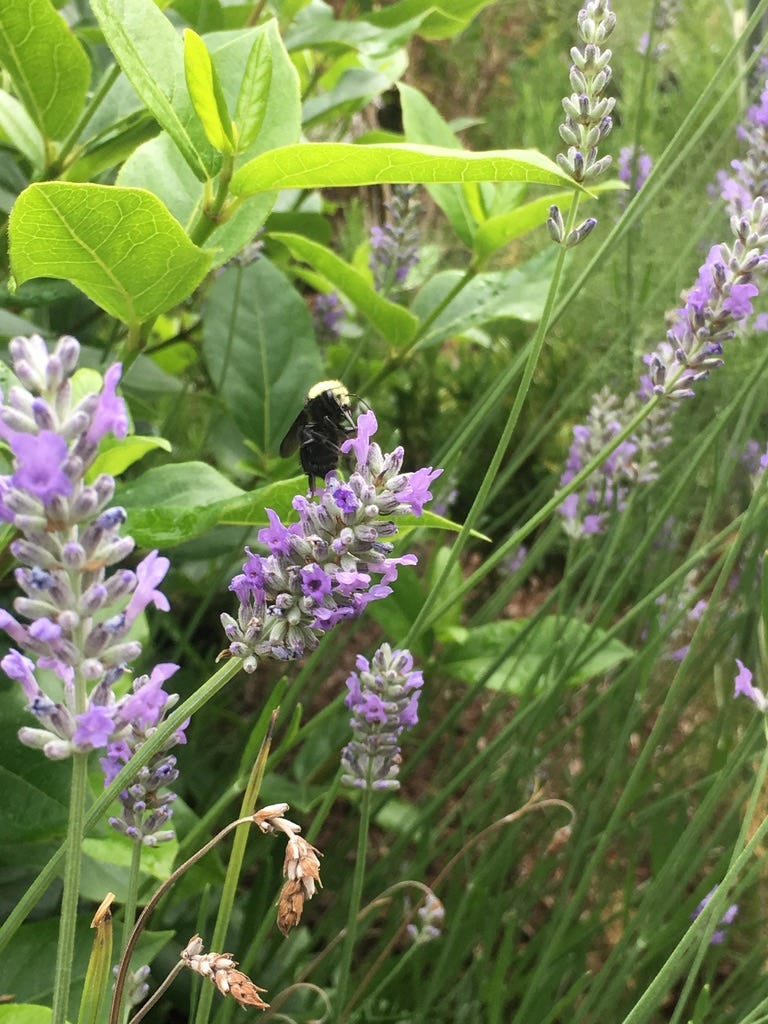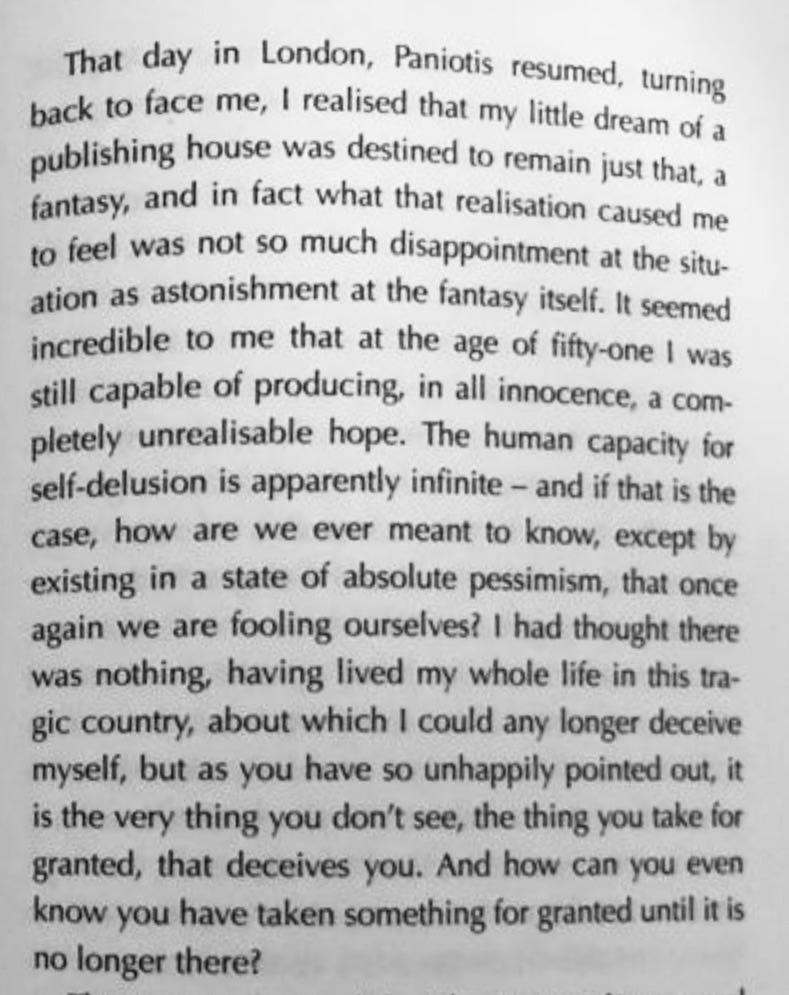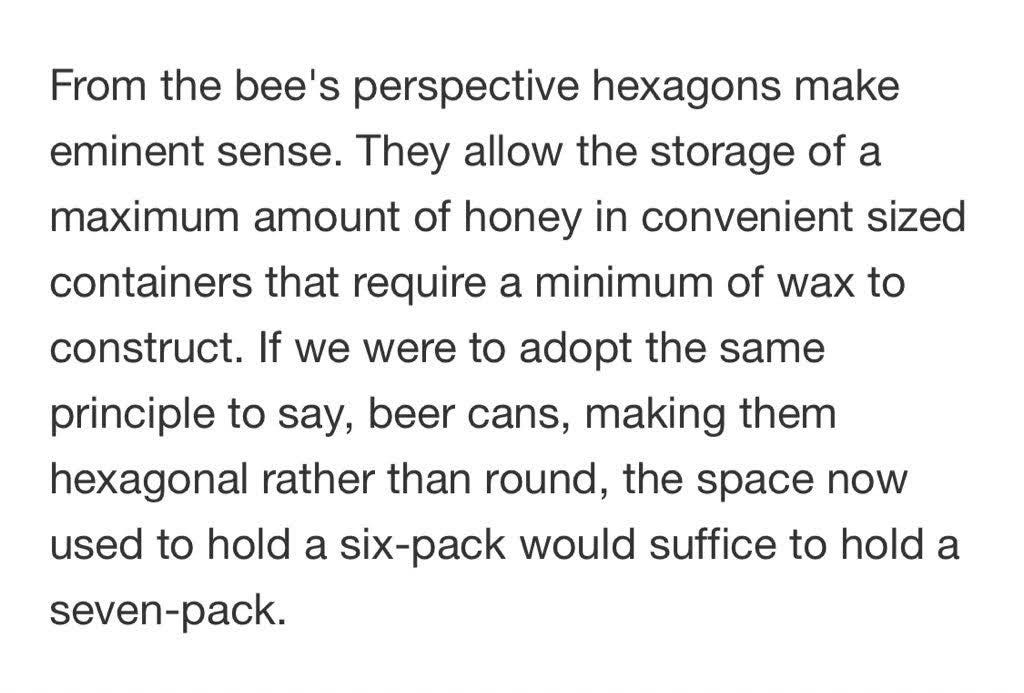The Human Capacity For Self-Delusion Is Apparently Infinite
And thank God for that.
Last week, drawing on a longtime Instagram friendship, I was able to take a tour of the production facility for my favorite local place to get honey stuff. Not just the substance itself but candles, deodorants, chapsticks, the works. During the visit, the owner Anne and I bartered a signed pair of my books for a whole bunch of those things, which brought me far more joy than selling them for money ever has.
I bring this up not because I’m pivoting to sponsored content (although if any #brands want to fund this newsletter, please know I’m not above selling out) but because for a long time now I have had a wild dream that someday I will keep bees and make my own honey. Unlike other things that have taken a hold of me I am unable to trace this particular dream to its genesis, but it persists despite its lack of foundation.
Isn’t it exciting, and humbling, to have wild dreams that your previous life experience gives you very little business having? Some of them have really worked out for me—hiking the Pacific Crest Trail, obsessively studying neighborhood crows, my own marriage. (In the summer after our 6th grade year at Wellwood Middle School, I had a dream about going roller-skating with one of my classmates despite hardly knowing her. Fixated for weeks on this dream, I asked her out. We dated three separate times between 7th grade and the end of high school, becoming best friends between the breakups, and now we file our taxes jointly. Life is weird.)
Others, like the beekeeping dreams or my firm belief that I will one day own and operate a dusty used bookstore-and-pub called The Parting Glass, I have done zilch to bring to life. Yet, I tell myself. Yet.
Recently my friend Mari shared a passage from a book, Rachel Cusk’s Outline, that speaks to the irrepressible human ability to conjure dreams and delusions and in fact led me to write about any of this at all.
At fifty-one Paniotis seems stunned by his own delusions, by the idea that he can’t recognize them for what they are in the moment. But for my part I can think of nothing better than the idea that two decades hence I might still be dreaming and scheming and making room for the possibility of grand new experiences and catastrophic failures. “How are we even meant to know,” he asks, “that once again we are fooling ourselves?” I would argue that we are not. These dreams and delusions are an essential part of my humanity, and I suspect that to be true of most other people, too.
Honey is a pretty remarkable thing. Some of its more fantastic properties are already well-known, like the fact that it stays edible indefinitely. (Viable stored honey has been found in the tombs of pharoahs and in a 5,500 year-old settlement in Georgia.) But it also has all sorts of other traits that make it valuable: it can be used as an antiseptic wound covering that produces its own hydrogen peroxide, for example. It can be used to detect concentrations of radioactive material in its environment. It changes in color and flavor profile depending on the pollinator plants the bees have visited, yes, but even more dramatic shifts can happen if the bees are let loose near candy factories or mob-backed maraschino cherry facilities or in an area dense with invasive bug species. Medicinal, environmental, and crime-solving power all in one simple substance: remarkable.
Who wouldn’t want to be part of producing something that is so grandly useful as to seem almost magical, I ask myself. Really the best argument for holding back takes the form of the oldest what if in the book: What if you fuck it all up? You kill the bees off through mismanagement or misunderstanding, you never get any honey out of them, you get all your friends and pets and loved ones stung, you discover that your abilities do not keep pace with your capacity for wonder. What then?
This is of course the best argument for not doing most hard things, for not chasing most dreams. In my life I have had to contemplate those possibilities as they pertain to plenty of things I have done and am doing, like getting a dog or deigning to get a job teaching people things. What if you mess up the training and create a monster. What if you leave some coffee or chocolate where you shouldn’t. What if you have such a bad week teaching that a kid drops out and never finishes their degree. What if you aren’t preparing them they way you think you are.
It applies to things I have not done but would like to, like having children. (I won’t list the what-ifs for that one, as email newsletters have a size limit.)
As a fanciful and scatterbrained person I am regularly awed by the competent, the practical, the levelheaded among you. I wonder if such people are plagued by the same questions about their dreams and desires, or if they don’t register at all, or if those questions surface but are addressed quickly and efficiently and then put away.
Regardless of what transpires in the minds of people I will never understand, I think the goal is the same either way: Keep dreaming. As we say in the socialist world: it’s not enough to be against things, we have to be for things, too. That holds true for things that we know we won’t live to see, too. And like Paniotis asks—what is the alternative, short of degrading ourselves to a state of pure cynical pessimism? We need our dreams and delusions.
Thanks, as always, for reading. I’ll talk to you next week.
-Chuck
PS - If you liked what you read here, why not subscribe and get this newsletter delivered to your inbox each week? It’s free and always will be.
PPS - This newsletter is free, but not cheap, so if you want to support Tabs Open, you might consider purchasing some stickers or my book, A Good Place for Maniacs: Dispatches from the Pacific Crest Trail.





